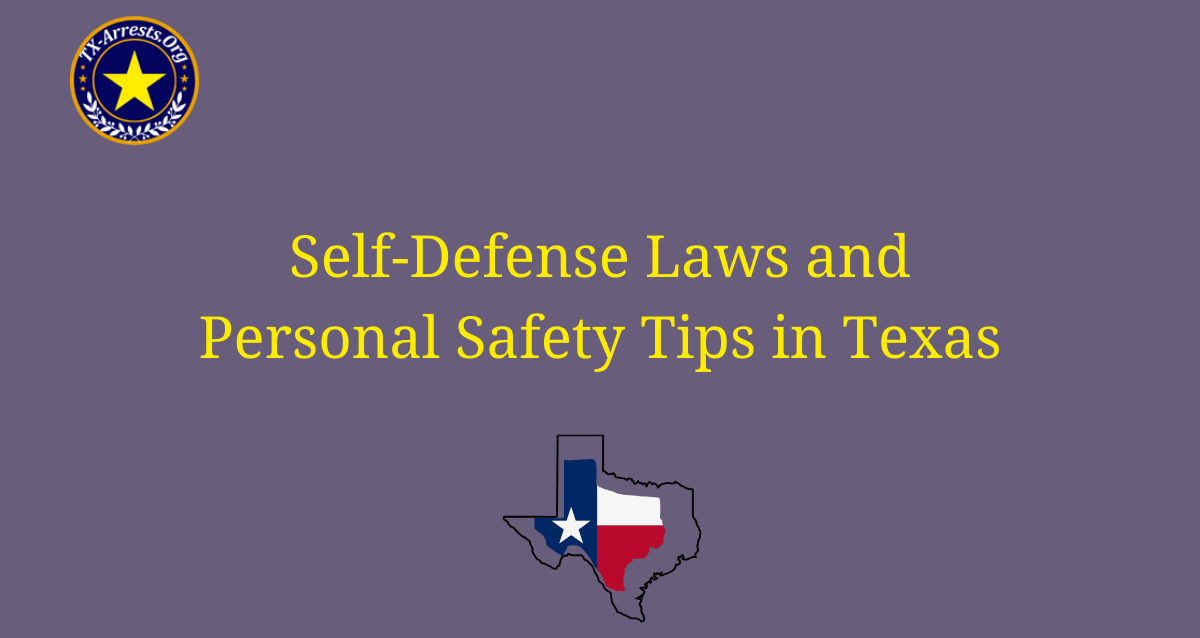Self-Defense Laws and Personal Safety Tips in Texas

Self-defense laws and personal safety tips are essential knowledge for residents of Texas. With a diverse population and bustling cities, it is crucial to understand your rights and how to protect yourself in various situations. Texas has specific laws regarding self-defense, and being aware of them can make a significant difference in your personal safety.
One important aspect of self-defense laws in Texas is the “Castle Doctrine,” which allows individuals to use force, including deadly force, to protect themselves, their property, and others in their home or vehicle. This law recognizes the fundamental right to feel safe and secure in your own space and provides legal protection if you find yourself in a threatening situation. Understanding this doctrine and its implications can empower individuals to take necessary actions to defend themselves and their loved ones.
Self-Defense Laws in Texas
Self-defense laws and personal safety tips are essential knowledge for residents of Texas. With a diverse population and bustling cities, it is crucial to understand your rights and how to protect yourself in various situations. Texas has specific laws regarding self-defense, and being aware of them can make a significant difference in your personal safety.
The Castle Doctrine: Your Right to Protect Yourself
One important aspect of self-defense laws in Texas is the “Castle Doctrine,” which allows individuals to use force, including deadly force, to protect themselves, their property, and others in their home or vehicle. This law recognizes the fundamental right to feel safe and secure in your own space and provides legal protection if you find yourself in a threatening situation. Understanding this doctrine and its implications can empower individuals to take necessary actions to defend themselves and their loved ones.
Stand Your Ground: No Duty to Retreat
In addition to the Castle Doctrine, Texas follows a “Stand Your Ground” principle. This means that individuals have no duty to retreat before using force in self-defense, even if they could have safely done so. In other words, if you believe that you are facing imminent harm or threat, you have the right to stand your ground and defend yourself without having to first try to escape the situation.
Use of Force: Reasonable and Proportional
While Texas law allows individuals to defend themselves, it is important to understand that the use of force must be reasonable and proportional to the threat faced. This means that you cannot use excessive force or go beyond what is necessary to protect yourself or others. Understanding the concept of reasonable and proportional force can help prevent legal complications and ensure that you stay within the boundaries of the law.
Imminent Threat: The Key Factor
When considering self-defense, it is crucial to recognize the concept of an imminent threat. In Texas, the use of force is justified if you reasonably believe that you or someone else is facing immediate danger of bodily harm or death. The key factor is the perception of threat at the time the force is used. Understanding what constitutes an imminent threat can help you make informed decisions in self-defense situations.
Legal Protection: Knowing Your Rights
Being aware of self-defense laws in Texas not only empowers individuals to protect themselves effectively but also provides legal protection. Understanding your rights and the laws surrounding self-defense can make a significant difference in the outcome of a self-defense situation. By knowing the legal framework, you can confidently navigate through challenging situations while safeguarding your personal safety and well-being.
Continued Learning: Personal Safety Tips
In addition to understanding self-defense laws, it is crucial to educate yourself about personal safety tips. These tips can help you avoid dangerous situations and minimize the risk of becoming a target. Topics such as situational awareness, self-defense training, and home security can further enhance your personal safety. Continuously learning and staying informed about personal safety measures is an essential part of maintaining a secure and protected lifestyle.
FAQs
What are the self-defense laws in Texas?
In Texas, individuals have the right to use force, including deadly force, to protect themselves or others from imminent harm. The state follows the “Stand Your Ground” law, which allows individuals to use force if they reasonably believe it is necessary to protect themselves from serious bodily injury or death.
Can I use deadly force to protect my property in Texas?
In Texas, you cannot use deadly force solely to protect your property. Deadly force is only justified if you reasonably believe it is necessary to protect yourself or others from imminent harm. However, you can use non-deadly force, such as physical force, to protect your property.
What should I do if I am involved in a self-defense situation in Texas?
If you find yourself in a self-defense situation in Texas, it is important to immediately contact the police and report the incident. It is also crucial to gather any evidence, such as witnesses or video footage, to support your claim of self-defense. It is recommended to consult with a lawyer to navigate the legal process.
Are there any restrictions on carrying weapons for self-defense in Texas?
In Texas, individuals are allowed to openly carry firearms without a license. However, if you wish to carry a concealed handgun, you must obtain a License to Carry (LTC) from the Texas Department of Public Safety. Certain places, such as schools and government buildings, have restrictions on carrying weapons.
What are some personal safety tips for individuals in Texas?
To ensure personal safety in Texas, it is recommended to be aware of your surroundings and avoid risky areas, especially at night. It is important to trust your instincts and take self-defense classes to learn basic techniques. Additionally, keeping emergency numbers handy and informing someone about your whereabouts can be helpful.
Can I use self-defense as a defense in a criminal trial in Texas?
Yes, self-defense can be used as a defense in a criminal trial in Texas. If you can prove that you acted reasonably and in accordance with the state’s self-defense laws, it may result in an acquittal or a reduction in charges. It is crucial to consult with a lawyer to build a strong defense strategy.






